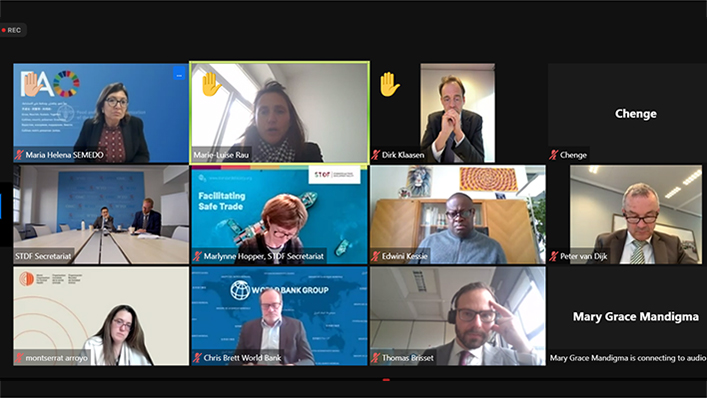
“Global partnerships like STDF are crucial to help farmers, producers, traders and governments in developing countries address some of the main challenges the world is facing today,” said DDG Paugam. “Around us, we are still grappling with the impacts of the COVID-19 pandemic on our lives and our economies. Climate change is on the rise and has a clear impact on the occurrence of new pests and diseases, and on food safety.”
The meeting, held virtually, was attended by senior representatives of STDF’s founding partners and donor members represented by France, Germany and the Netherlands as well as STDF developing country experts.
“The meeting today is a testimony of STDF being a strong, vibrant and well-functioning partnership, and I see the upcoming external evaluation as an opportunity to further strengthen our collaboration,” noted DDG Paugam.
The Policy Committee approved the terms of reference for the external evaluation, which will assess STDF’s results and impact in facilitating safe agriculture trade, taking into account the effects of the global COVID-19 pandemic on STDF’s operations.
The evaluation is expected to generate key lessons and recommendations to inform STDF’s future strategy for supporting developing countries in meeting international food safety and animal and plant health standards. It will cover STDF’s global activities, including knowledge work and grants, with an in-depth assessment of results and impacts achieved by three STDF projects on the ground.
The process will leverage the knowledge and insights of STDF members, clients in developing countries, and other organizations involved in SPS capacity development.
Members of the Policy Committee commended the work carried out by STDF and made suggestions to further enhance STDF’s global partnership. Maria Helena Semedo, Deputy Director-General of the Food and Agriculture Organization (FAO) of the United Nations, recommended identifying alternative financing sources to enable more stakeholders to benefit from STDF’s innovative SPS projects.
Christopher Brett, Lead Agribusiness Specialist at the World Bank Group, highlighted the huge pressure stakeholders in developing countries face to meet SPS and other standards relevant for agri-food trade, encouraging STDF to use its wealth of institutional experience to seek new opportunities to scale up its work and implement larger projects.
Marie-Luise Rau, agri-food trade economist at the Federal Ministry of Food and Agriculture of Germany, encouraged ongoing exchanges among members, partners, donors and beneficiaries to act as a catalyst for influencing SPS capacity development.
Dirk Klaasen, Head of Trade and Investment Policy at the Ministry of Foreign Affairs of the Netherlands, reiterated the commitment of his government to STDF and its pioneering work in enhancing SPS compliance in developing countries, which contributes to sustainable food systems around the world.
Members recognized STDF’s valuable contribution to ongoing work in the WTO SPS Committee in its follow-up to the Ministerial SPS Declaration: Responding to Modern SPS Challenges, agreed at the 12th WTO Ministerial Conference in June 2022.
Background
The STDF is a global multi-stakeholder partnership to facilitate safe and inclusive trade, established by the Food and Agriculture Organization of the United Nations, the World Organisation for Animal Health, the World Bank Group, the World Health Organization and the World Trade Organization, which houses and manages the partnership. The STDF responds to evolving needs, drives inclusive trade, and contributes to sustainable economic growth, food security and poverty reduction, in support of the United Nations’ Sustainable Development Goals.
Share
Reach us to explore global export and import deals